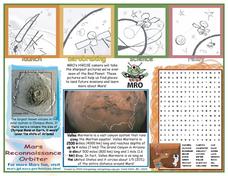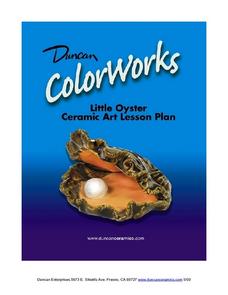NASA
Space Images
As technology advances, so does our understanding of the universe around us. Thanks to the Hubble Telescope, Mars rovers, and other high-resolution cameras, there are amazing photographs of celestial bodies, planets, comets, and more...
Curated OER
Message in a Bottle - A Satellite Journey through the Gulf Stream
The Gulf Stream has historically provided humans with a faster trade route because of its swift-moving waters. It continues to be a source of information and fascination for oceanographers today. As your class views this collection of...
Messenger Education
Mission: Possible—How Can We Plan an Exploration of Another World?
An astronaut's spacesuit weighs 280 pounds and takes 45 minutes to put on — that's a serious suit! The second activity of a three-part series allows pupils to see all that goes into space exploration. Through simulations, groups analyze...
University of Colorado
Great Red Spot Pinwheel
The great red spot on Jupiter is 12,400 miles long and 7,500 miles wide. In this sixth part of a 22-part series, individuals model the rotation of the Great Red Spot on Jupiter. To round out the activity, they discuss their findings as a...
Curated OER
Strong as the Weakest Link
Students recognize that compression and tension forces are important considerations in building structures. They construct their own building structure using marshmellows and spaghetti to see which structure can hold the most weight.
Teach Engineering
Edible Rovers
The good thing about building this rover is you get to eat it afterwards. Pairs determine rover parts they want to include in their design based upon their cost and usefulness. The teams design their rovers, build them from edible...
Curated OER
Ocean Impacts of an El Nino Event
Students study sea surface height and temperature and other characteristics of an El Nino. In this ocean impacts lesson students examine the factors that influence an El Nino or La Nina.
Laboratory for Atmospheric and Space Physics
Jupiter’s Relative Size
How do you properly illustrate the extreme size difference between two planets—Earth and Jupiter? With the help of jellybeans, of course! Create a scale model of Jupiter's mass compared to Earth using a fishbowl, 1,400 beans, and a...
University of Colorado
The Jovian System: A Scale Model
Jupiter has 67 moons! As the seventh in a series of 22, the exercise shows learners the size and scale of Jupiter and its Galilean moons through a model. They then arrange the model to show how probes orbited and gathered data.
University of Colorado
Are All Asteroids' Surfaces the Same Age?
There are more than 600,000 asteroids in our solar system. Pupils analyze images of two asteroids in order to determine if they are the same age. They count craters for each asteroid and compare numbers.
University of Colorado
Spacecraft Speed
Space shuttles traveled around Earth at a speed of 17,500 miles per hour, way faster than trains, planes, or automobiles travel! In the 13th installment of 22, groups graph different speeds to show how quickly spacecraft move through...
University of Colorado
Are All Asteroids' Surfaces the Same Age?
Did you know scientists can tell the age of an asteroid by looking closely at its craters? This final lesson of a six-part series focuses on two asteroids, Gaspra and Ida, in order to demonstrate the concept of dating asteroids. Scholars...
Research Parent
Universe Cards
A 9-page packet comes with 24 cards that have pictures and informational text about each object in the universe. From nebulae to dwarf planets, objects we see—or don't see—are represented in the cards through pictures and words.
Curated OER
Alka-Seltzer Rockets: How to Build Your Own Rocket
Students create a rocket using Alka-seltzer of baking soda and vinegar. In this physics lesson, students identify the factors affecting the length of time the rocket is propelled. They relate this activity to actual rocket launched in...
Curated OER
Soda Straw Rocket Activity
Students construct a rocket using soda straw. For this physics lesson, students determine the nose cone length that produces the best rocket. They explain the importance of using a control in an experiment.
Curated OER
Mud Splat Craters
Students simulate crater formation using mud. For this earth science lesson, students identify the features of a crater. They explain how the force of impact affect the crater's appearance.
Curated OER
Impact Craters
Young scholars investigate the factors affecting the size of a crater. In this space science instructional activity, students collect data from the activity and graph them. They explain how velocity of impact relate to crater size.
Curated OER
Mars Reconnaissance Orbiter Fact Sheet
In this space worksheet, students will read facts about Mars and the Mars Reconnaissance Orbiter. Students will also find 24 space related words in a word search.
Curated OER
Lotto or Life: What Are the Chances?
Though the website does not seem to have the mentioned video, a reding and lottery style games simulate the chances of finding intelligent life somewhere other than Earth. Without the video, this lesson is short, but it can be a useful...
Curated OER
Little Oyster: Ceramic Lesson
Children will love researching and then creating a bottom dwelling mollusk of their own. They watch clips describing the ocean ecosystem and how oysters fit into their environment. Next, they research what oysters eat and how they look....
Curated OER
Chemosynthesis for the Classroom
Explorers set up Windogradsky columns with local mud so that they can culture microorganisms. After three and six weeks they make observations of the mud and the organisms growing in it. In this way they observe succession and relate...
Curated OER
Square Roots Using a Carpenter's Square
Students calculate the square root of a given number using carpenter's square measurements. In this math lesson, students relate this method on the Pythagorean theorem. They answer practice problems after the exploration activity,
Curated OER
Exploring the Planets
Students study robotic spacecrafts that have provided detailed information about the inner and outer planets. In this exploring the planets lesson plan, students use posters and diagrams to study the various robotic spacecraft sent to...
Curated OER
Sweet Candy Comets
Fourth graders use candy to make a comet. In this lesson, 4th graders examine the role comets have played throughout history, students watch NASA videos about comets and complete the lesson by making an edible model of a comet. This...























